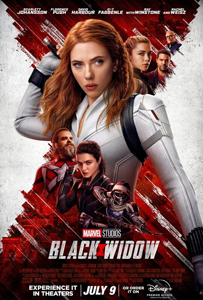After far too long a wait, the Marvel Cinematic Universe’s big-screen diversity push finally gets to its solo movie about the lone female Avenger, “Black Widow” (Disney Plus and theaters). Better late than never, we get a sidequel story that takes place when the Avengers are on the run from the U.S. government after “Age of Ultron” (2015).
Avenger on the run
Among those holding an anti-registration position is the title character, more commonly called Natasha (Scarlett Johansson).
Written by Eric Pearson (“Godzilla vs. Kong”), this movie was needed for logistical purposes. It explains how Natasha is indeed Russian despite sounding American: She was raised for a time in Ohio by Russian agents (David Harbour’s Alexei and Rachel Weisz’s Melina).
“Black Widow” (2021)
Director: Cate Shortland
Writers: Eric Pearson (screenplay); Jac Schaeffer, Ned Benson (story)
Stars: Scarlett Johansson, Florence Pugh, David Harbour
The actors playing Natasha’s three pseudo-family members do a good job with the Russian accents. It’s no surprise that Florence Pugh (“Midsommar”) is great as kid sister Yelena; her versatility knows no bounds. Indeed, Pugh is an equal co-star to Johansson. No complaints from me.
But the scene-stealer is Harbour, whose superhero cred also includes 2019’s “Hellboy.” He’s unrecognizable behind his beard, but that scraggly mat of facial hair adds to his bear-like quality.
Alexei is selfish and likely smells bad (Yelena confirms this), but you kind of want to hug him. Harbour successfully hints there’s a heart squeezed into the Red Guardian costume along with the rolls of fat.
Interagency fighting
Director Cate Shortland respectably transitions from small films to spectacle. The one-on-one fight scenes are sometimes hard to follow, as if stunt doubles are being hidden with rapid editing, although there are neat moments.
And funny ones. The running gag of Yelena making fun of Natasha’s three-point superhero landing stance (“posing”) is an instant classic. Hey, sometimes fan service is on the money.
“Black Widow” continues in the tradition of the “Mission: Impossibles” and “Bournes” as it chronicles interagency fighting. In this case, though, every main character except Alexei and the villain, Ray Winstone as the deliciously slimy Dreykov, is a woman.
It’s superficially unusual, and it does have impact. I like how the film is about girl power without talking about it all day, something “Captain Marvel” is comparatively guilty of.
Inhumane training
In addition to her gender, Natasha is also unusual in that she doesn’t have superpowers or a suit; instead, she was inhumanely trained – and now she has almost inhuman assassination skills.
As such, “Black Widow” isn’t exactly the “everyday hero” superhero entry; you’re more likely to find that from TV’s upcoming “Hawkeye.”
Indeed, the final-act action is as bombastic as anything in the saga. It’s staged well and it fits tonally, as the sisters outright describe this almost suicidal mission as “fun.”
But it also plays faster and looser with plausibility than we’ve previously seen in the MCU. Not to the level of the “Fast & Furious” saga, but it’s something the MCU shapers might want to be cautious with.
Flirting with issues
Like so many finely crafted MCU films, “Black Widow” has it both ways: It’s about important topics, but mostly it’s all in good fun. The Red Room program that grabs girls from their homes to turn them into Widows started in the USSR and it continues into 2010s Russia.
(Red Room dates back to the 1940s of the TV series “Agent Carter,” on which Pearson was a writer. A post-credits teaser gives us a reason to watch “Hawkeye,” but I personally need to watch “Carter,” which I didn’t give enough of a chance when it aired.)
Pearson tiptoes around a robust analysis of how the Soviet system quashed individualism. For one, this program uses mind-control; none of the villains are responsible for their actions except Dreykov. For another, none of the core Russian family is played by a Russian actor; this encourages us to lean toward laughing.
If one wants to be generous, the fact that Red Room HQ isn’t well-hidden could be seen as “Black Widow’s” commentary about how the Avengers overlook missions that don’t directly affect Americans. (In the Avengers’ defense, it’s good that they aren’t automatically the World Police.)
“Black Widow” has so many good elements that I want to make excuses for the sketchier things. But mainly, I’m glad Natasha finally has her own movie – and a darn good one.


